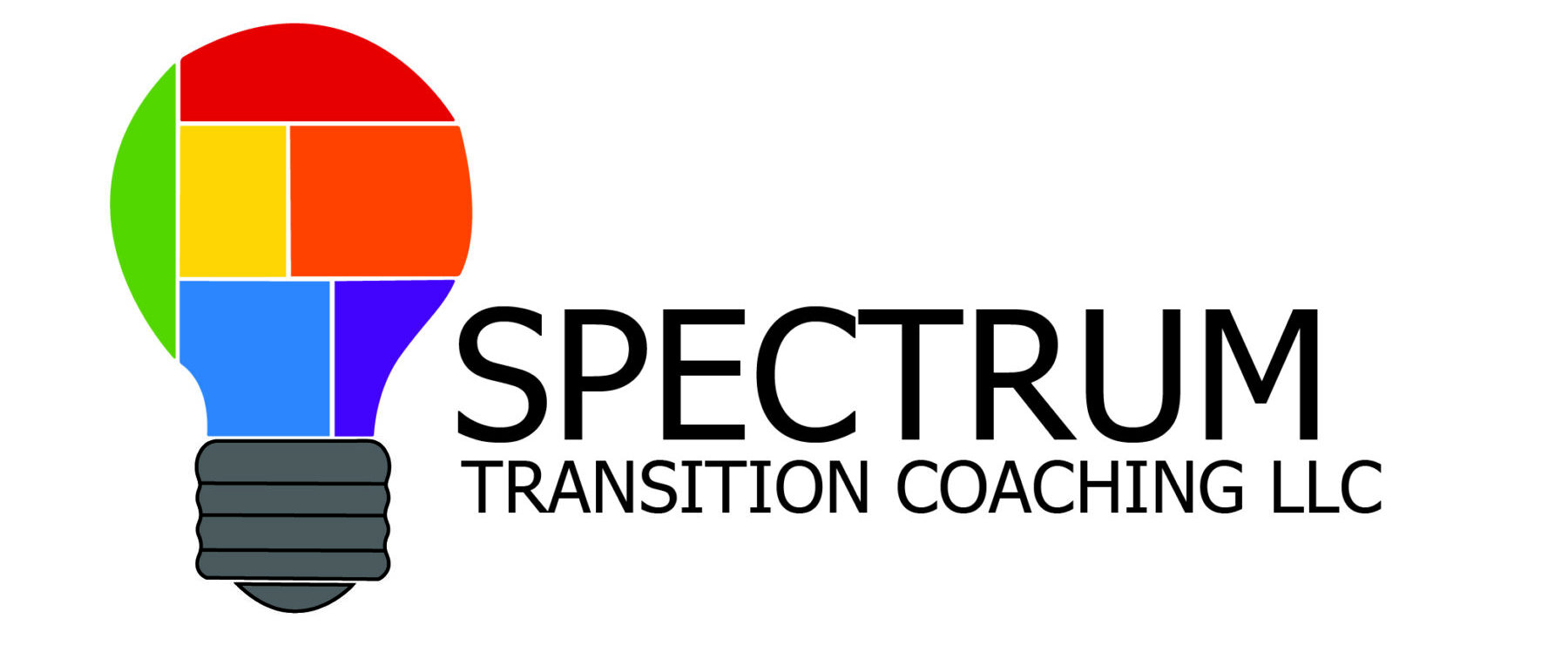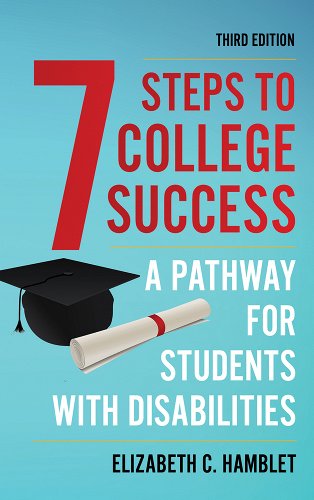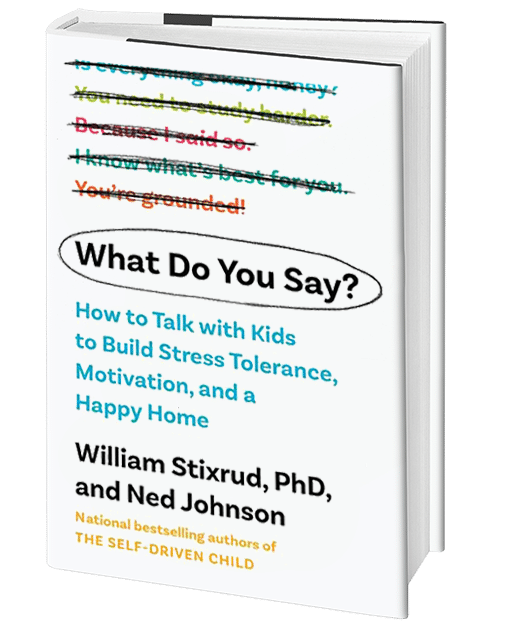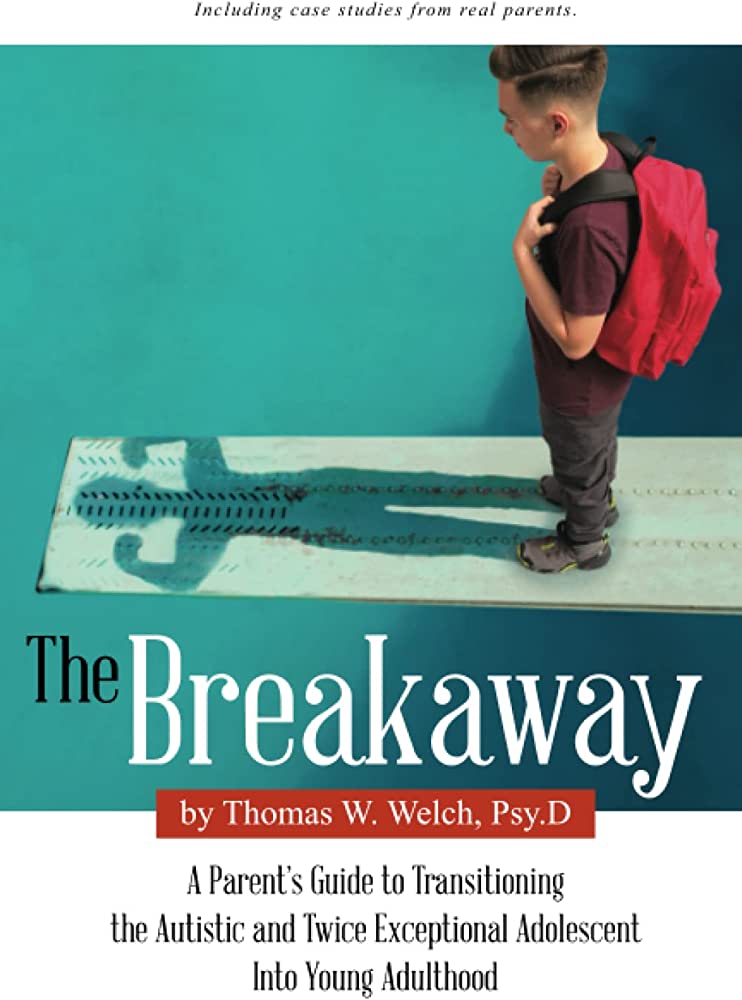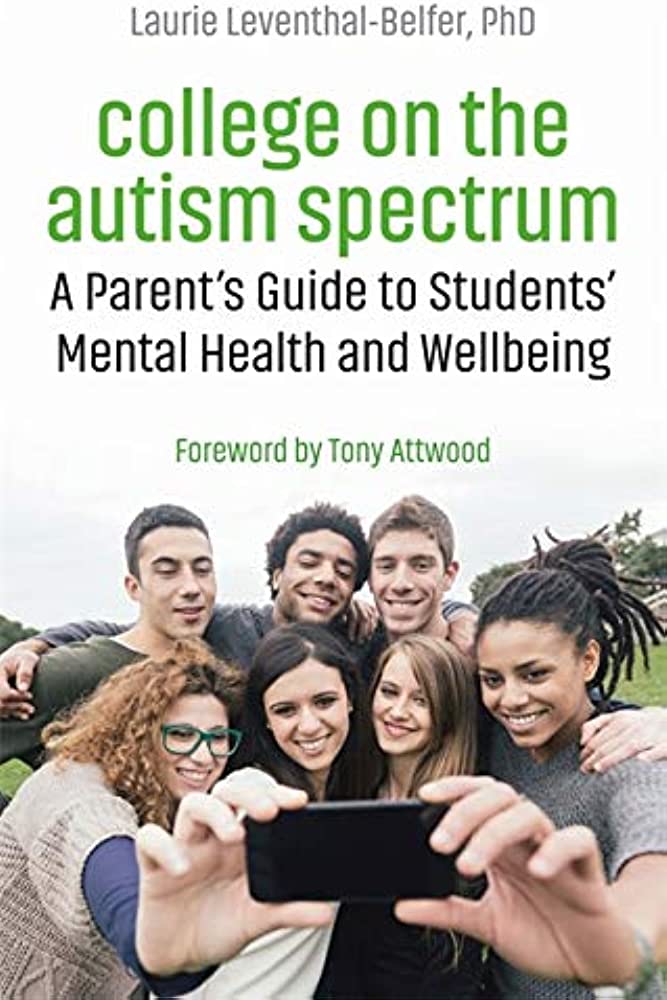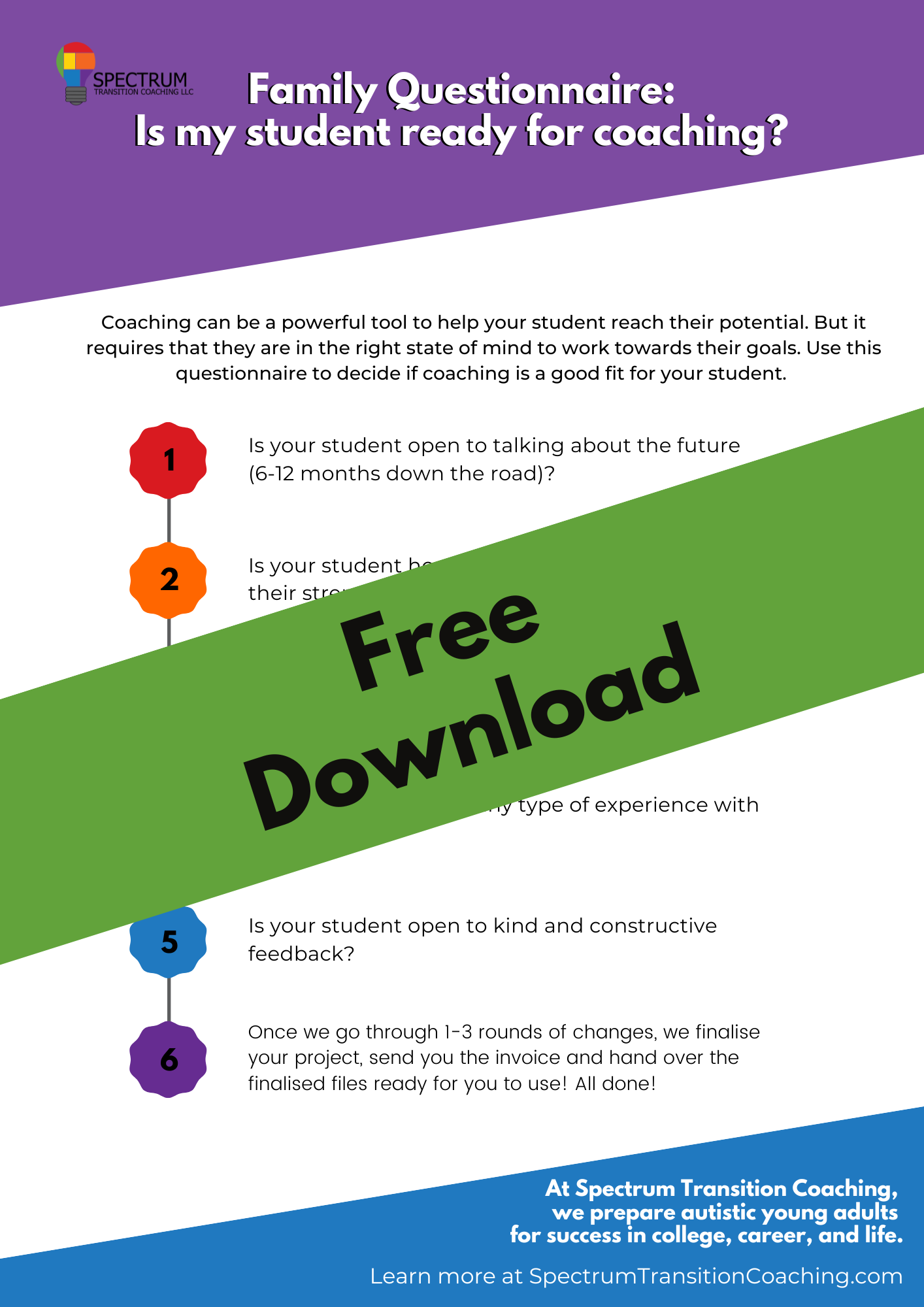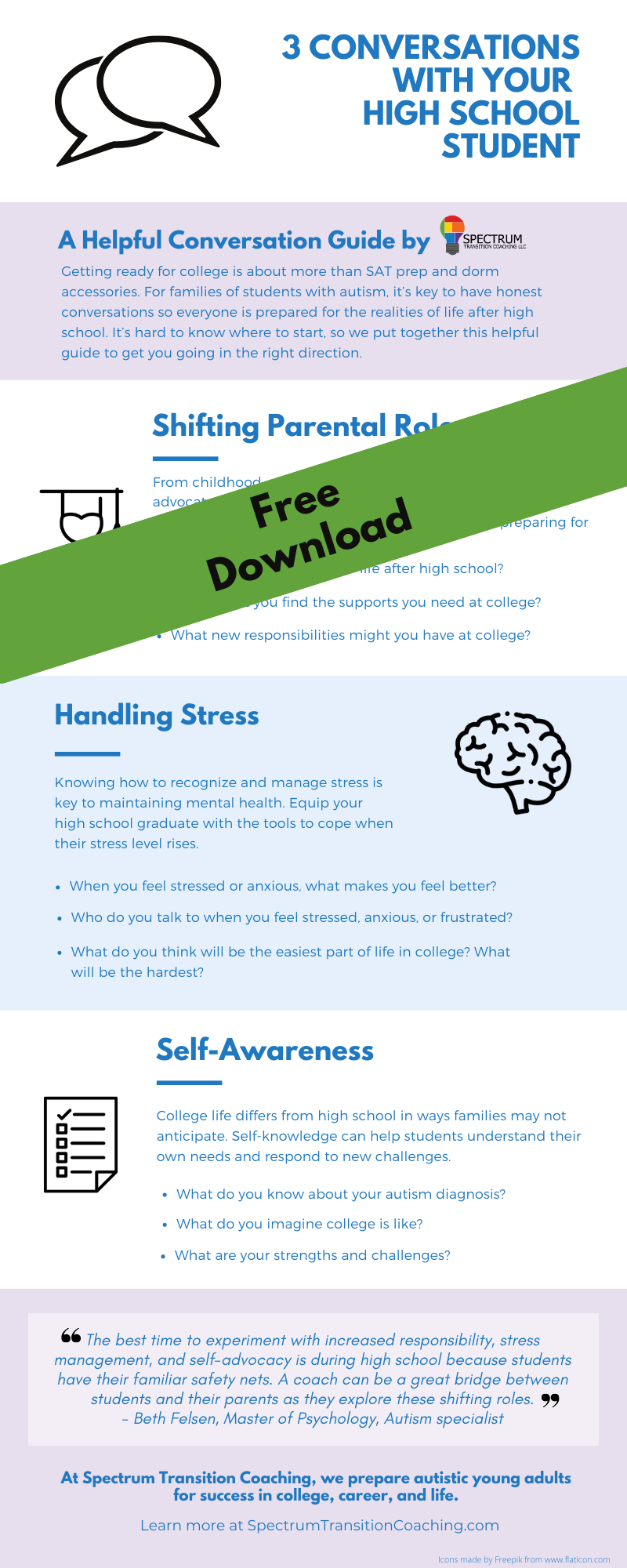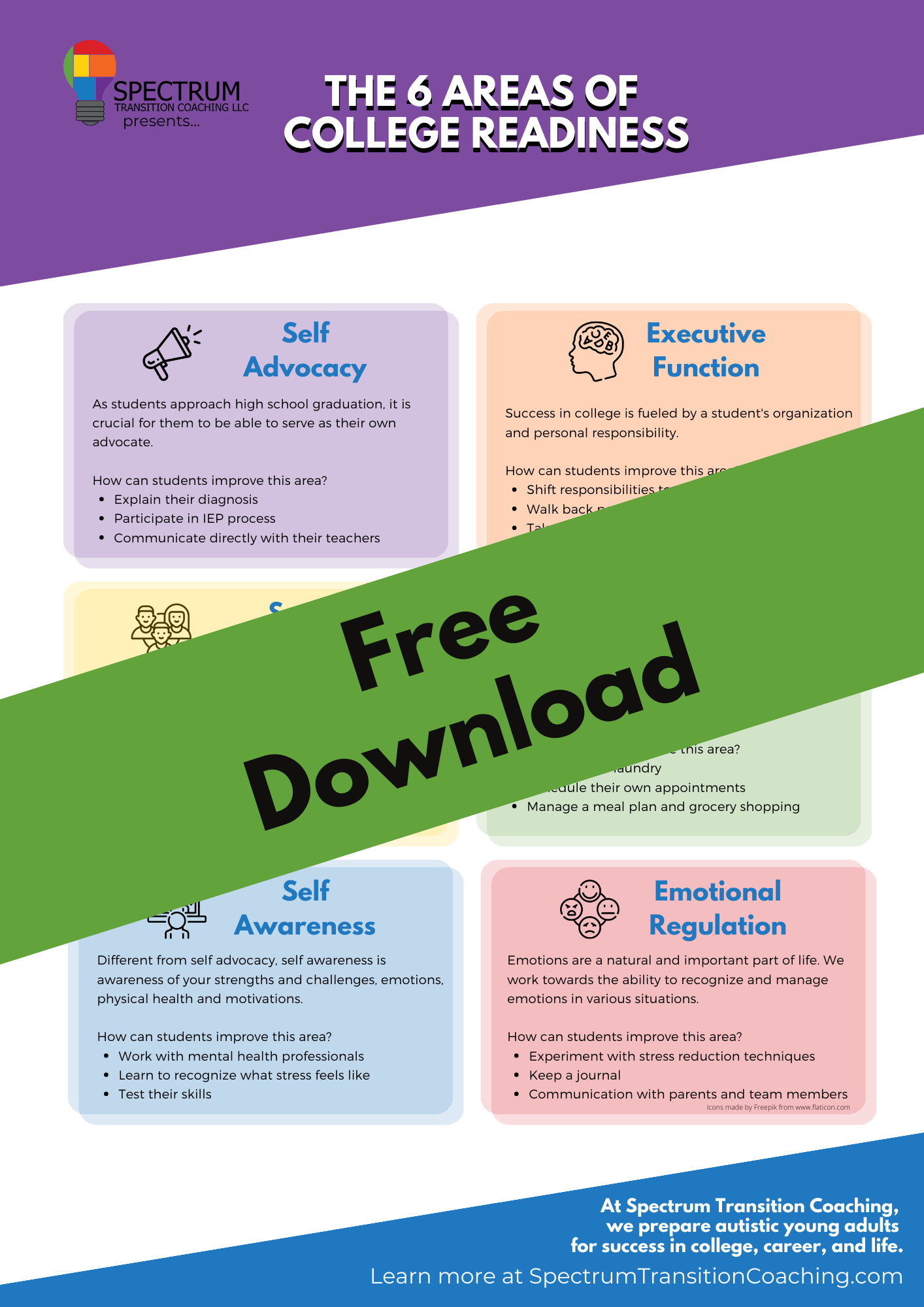The Ultimate Guide for Parents of Autistic High School Students
By Spectrum Transition CoachingHelping families and young adults navigate life with autism
Parenting during the high school years is an adventure. From navigating friendship dynamics to staying on top of classes to thinking about the future, it’s a major transition for your family. For autistic high school students, this time can be especially challenging.
Autistic high school students are discovering who they are and what they want to do in the world. At the same time, they are finding their own identities apart from their parents and striving for acceptance from their peers. With all of these major changes happening, it’s no wonder that the high school years can be really tough!
If you’re a parent of an autistic high schooler, you’re in the right place. We’ve compiled the best resources, blog posts and guides to help your family navigate this phase.
Who We Are and What’s Inside
Spectrum Transition Coaching prepares autistic young adults for success in college, career, and life. With a variety of coaching packages to fit your needs and timeline, we work closely with families to help them navigate life’s transitions. From getting ready for college to building independence or finding a good fit job, Spectrum Transition Coaching supports autism families just like yours.
Recommended reading
We’ve read piles of books on autism and parenting to narrow down the most useful for you.
Helpful blog posts
Some of our most popular blogs that speak to parents in your phase of life.
Conversation guides (free downloads)
A useful tool so you can start having productive and meaningful conversations with your autistic teen.
College readiness resources
Useful tools as your family starts to think about what comes next after high school graduation.
When my children were preparing to go from high school to college, I was shocked at just how much their lives were about to change. High school is structured with very little free time. Comparatively, college has ample free time and assumes students know how to balance and plan wisely.
“High school is an important stepping stone to adulthood for autistic teens. Increasing independence during these years, with family support nearby, is so important.”
– Coach Beth
Recommended Reading
We all learn a little differently. If you are a reader, I highly recommend these books to help you better understand parenting autistic high school students.
Important note: I find each of these books to have valuable information for parents of autistic young adults. However, they do cover some controversial topics which may not align completely with my personal views. As always, read thoughtfully and decide what is best for your unique family.
Seven Steps to College Success: A Pathway for Students with Disabilities
By Elizabeth C. Hamblet
The disability landscape changes from high school, where students are under 18 years of age, to college, where they are legal adults over 18 years of age. Accommodations that were granted in high school will need to be presented and approved in college. Autistic college students need to be prepared to work alongside the disability services office to get the supports they need. Hamblet’s book also explains skills needed to grow independence and outlines the admissions process.
What Do You Say? How to Talk with Kids to Build Motivation, Stress Tolerance, and a Happy Home
By William Stixrud and Ned Johnson
It can be very frustrating to try to convince your child to do something that you KNOW will benefit them. Even worse, your attempts can drive a wedge between you and your child. William Stixrud and Ned Johnson address this dilemma and other important nuances of parent/child communication in their latest book What Do You Say? How to Talk with Kids to Build Motivation, Stress Tolerance, and a Happy Home.
The underlying premise of What do You Say? is that empathy and validation are the keys to communication. The authors explain that when parents ask: “how do I motivate my kid?” they are really asking “how do I get my kid to change” Most people are resistant to change. And parents need to realize that it is IMPOSSIBLE to force people to change. This book can help parents learn tools to help their kids feel better about change.
Parenting without Panic: A Pocket Support Group for Parents of Children and Teens on the Autism Spectrum (Asperger’s Syndrome)
By Brenda Dater
One of the most valuable tools a parent can have is a community of fellow parents who are going through similar phases and challenges. Though we feel isolated in our homes, the reality is that so many families are facing similar struggles and we can learn lessons from others’ experiences.
Author Brenda Dater facilitated support groups for parents of children on the spectrum and distilled her insights into this book. It’s easy to read and may spark new ideas that have worked for other families with autistic children.
This book has particularly helpful information on sibling relationships with autism and successful family vacations.
Uniquely Human: Updated and Expanded: A Different Way of Seeing Autism
By Barry M. Prizant, Ph.D.
Many parents of autistic children struggle with the label of ‘special needs’ or ‘disability.’ Autism may bring certain challenges but it also can bring incredible gifts, talents and capabilities for our wonderful kids.
Uniquely Human was one of the first books to share this new way of thinking about autism. It does not aim to eliminate symptoms, but rather to understand each individual and the reasons behind their behavior. This review says it best: “Prizant is a respected voice in the autism community, and the methods demonstrated here are backed by case study and experience. Parents, especially parents of the newly diagnosed, may find a ray of hope in the often bleak landscape of early diagnosis and the endless search for answers and information that inevitably results.” ― Library Journal
The Breakaway
by Thomas W. Welch
This is a great guide for parents in this exact phase of high school when students are starting to ‘breakaway’ and find their own identity. You’ll find this book useful to create a strategy that fits your family’s current situation with sections about:
- Readiness for Change
- Expectations
- Feedback
- Identity Development
- Accountability
- Resilience
- Commitment
- The Human Experience
College on the Autism Spectrum: A Parent’s Guide to Students’ Mental Health and Wellbeing
by Laurie Leventhal-Belfer
College with autism has a few more dimensions than college for neurotypical students. In addition to the regular course registration, dorm setup and roommate dynamics, autistic students also need to advocate for the accomodations they need, understand social expectations and build independence without you as a parent as their intermediary.
This book helps you understand the college environment in advance so that you and your student are better prepared when the time comes.
Helpful blog posts for parents of high school students
There’s no ‘correct’ way to parent a child with autism. We all have to figure out what works for our family and our unique student. But we don’t have to do it alone. The blog is a place where we share favorite resources, trusted experts in this space and reflections on parenting autistic students and young adults. Subscribe here.
Balancing Both Sides
Balancing Both Sides of Autism If you haven't seen it yet, one of the prominent autism organizations, AANE, has a new look and new name. Formerly the Asperger/Autism Network, AANE is now the the Association for Autism and Neurodiversity. Why does this matter? This...
Autism and Driving: Guest Post by Andrew Arboe
Guest post by Andrew Arboe Today I'm excited to share a guest post by Andrew Arboe, autism advocate and speaker. I've had the opportunity to hear Andrew speak about his experiences with driving as an autistic individual. I often discuss the importance of learning to...
Strengths & Challenges of Autism: Self-Advocacy
Strengths and support needs of autism Let's continue our discussion on the duality of autism. With my clients, I often talk about how autism brings incredible gifts and superpowers that create your unique personality - there is no one in the world exactly like you! On...
Conversation Guides
As your autistic student grows up and becomes more independent, you’ll both need to find your footing in these new roles. Your student is no longer a kindergartener who needs you to help them cross the street safely. Nor are they a full-grown adult who can pay their own bills on time. This phase is in the ‘messy middle’ where you’ll both need to figure out what works for your family.
There is no magic formula, but there is one essential ingredient: open conversation. You can’t read each others’ minds so open and honest conversation is key between parents and autistic high school students. Whether you share your perspectives over pizza, during a walk, or while you have a captive audience in the car, make sure you find time for it to happen.
Grab one of our free downloads below to help you get started:
IDEA vs. ADA
When your student turns 18 years old, the laws shift as well. Here is the key difference:
- K- 12 – IDEA (Individuals with Disabilities Education Act) Provides for Free and Appropriate Education (FAPE) for children ages 3-21 (through HS graduation). FAPE is defined as “specially designed instruction at no cost to the parents, to meet the unique needs of the child with a disability.” States are required by law to ensure “full educational opportunity.”
- Post-HS – ADA (Americans with Disabilities Act): Prohibits discrimination because of disability. Along with Section 504 of the Rehabilitation Act of 1973, the ADA requires reasonable modifications to policies, practices, and procedures for eligible individuals with disabilities.
These nuanced differences can get confusing. This comprehensive comparison from the Independent Educational Consultants Association can help break down the differences.
JAN, the Job Accommodation Network, is an excellent resources to learn more about resonable accommodations for your young adult.
A Simple Roadmap
If you’ve made it here, well done! You’ve just gotten a great overview of the key topics think about for your autistic high schooler. But we know it can be overwhelming. You don’t need to tackle all of these conversations and decisions at one time. In fact, it’s best to focus on small, consistent changes over time. Here’s a simple roadmap to help you get organized.
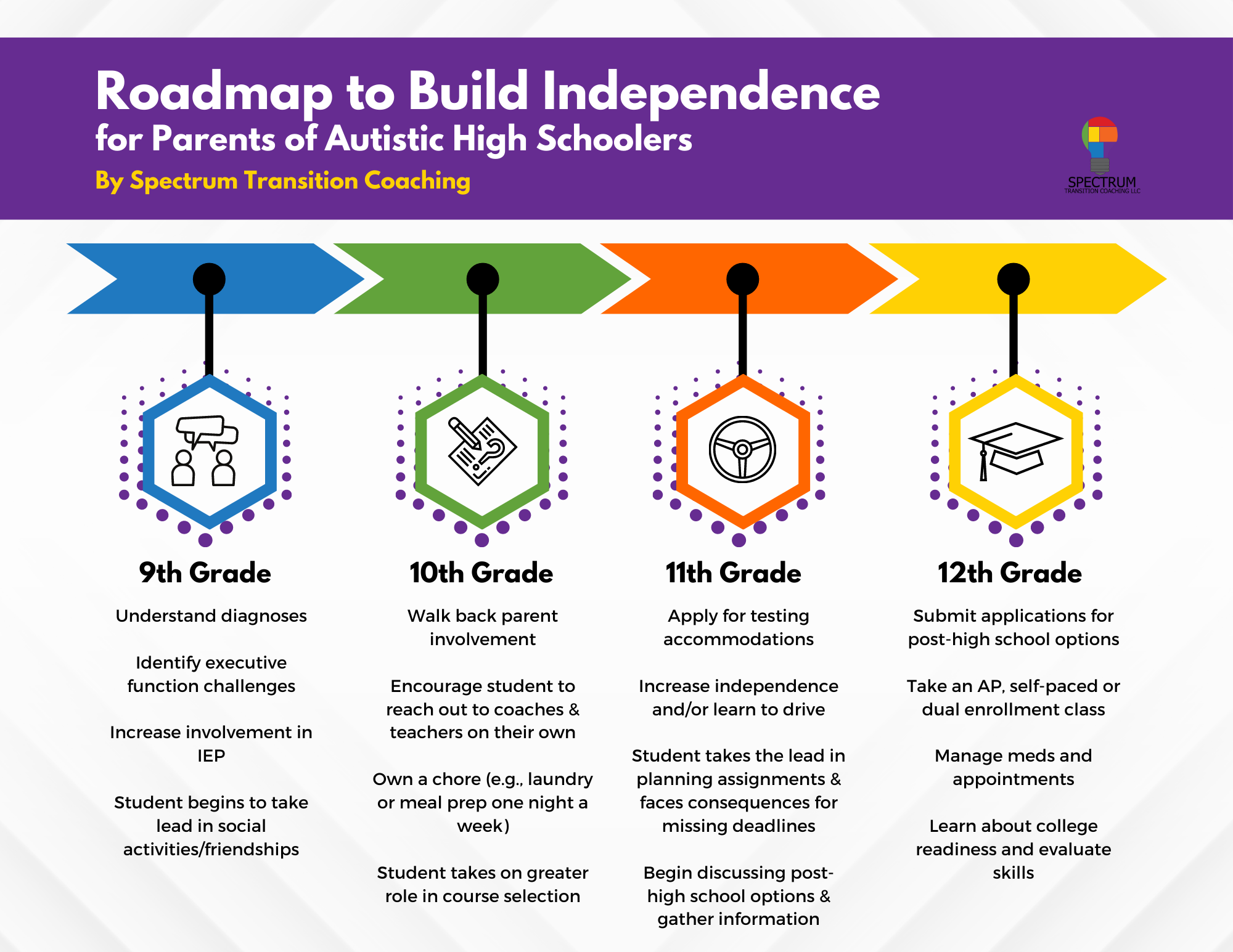
College Readiness Resources
Autistic high school students face significant decisions about the next steps of their life. These decisions are rightfully daunting. It feels like they are major commitments and the wrong move might harm your autistic student. There is not magic ball to help you decide, but you can take comfort that few decisions are permanent and you can always course correct if your student needs a new path.
Life after high school can take many paths. In addition to 4 year colleges, you can explore 2 year college programs, community colleges, vocational programs, college readiness experiences, work, volunteering and travel.
The College Autism Network is a nonprofit focused on improving access, experience and outcomes for autistic college students. Their efforts focus on student well-being, educational achievement and institutional responsiveness.
Their database of Autism-Specific College Support Programs (ASPs) is one of the most robust I have found.
Autism Campus Prep (ACP) is a free online post-secondary preparedness course written by and for individuals on the autism spectrum together with The Sinneave Family Foundation.
ACP is a resource for individuals on the spectrum who are looking to enroll in post-secondary, and would like a better understanding of the academic and non-academic challenges they may encounter and how to plan for life after graduation.
AANE works with individuals, families, and professionals to help people with Asperger Syndrome and similar autism-spectrum profiles build meaningful, connected lives.
The Mid-Atlantic ADA Center provides information, guidance, and training on the Americans with Disabilities Act (ADA), tailored to meet the needs of businesses, government entities, organizations, and individuals in the Mid-Atlantic Region (DC, DE, MD, PA, VA, and WV).
About Spectrum Transition Coaching
Helping families of autistic young adults navigate college, career, and life transitions
“Beth is wonderful. She really helped push some of the more difficult conversations between me and my son as he gets ready to leave the nest. Beth met both of us where we were, and are, in this process, and did so in the kindest and least judgmental way. She sees autism as a fact, not a disability, and her practical advice and encouragement will go far. Highly recommend!”
– Cece, parent of autistic young adult
Featured Practitioners
- Impact Parents: Help for parents raising complex kids and teens, Impact Parents offers Sanity School programs for parents and small group or private coaching.
- Eric Endlich, Ph.D.: Founder of Top College Consultants and Professional Member of the Independent Educational Consultants Association (IECA)
- Eric Jorgensen: Advocate for diability planning and founder of True North Disability Planning
- Frances Shefter:Education Attorney and Advocate at Shefter Law, founder of Stress-Free IEP™.
- Gabrielle Nicolet: Speech therapist and parent coach, co-founder of Raising Orchid Kids, a support and education organization for parents raising neurodiverse children
- Michelle McAnaney: College admissions consultant and founder of the The College Spy
